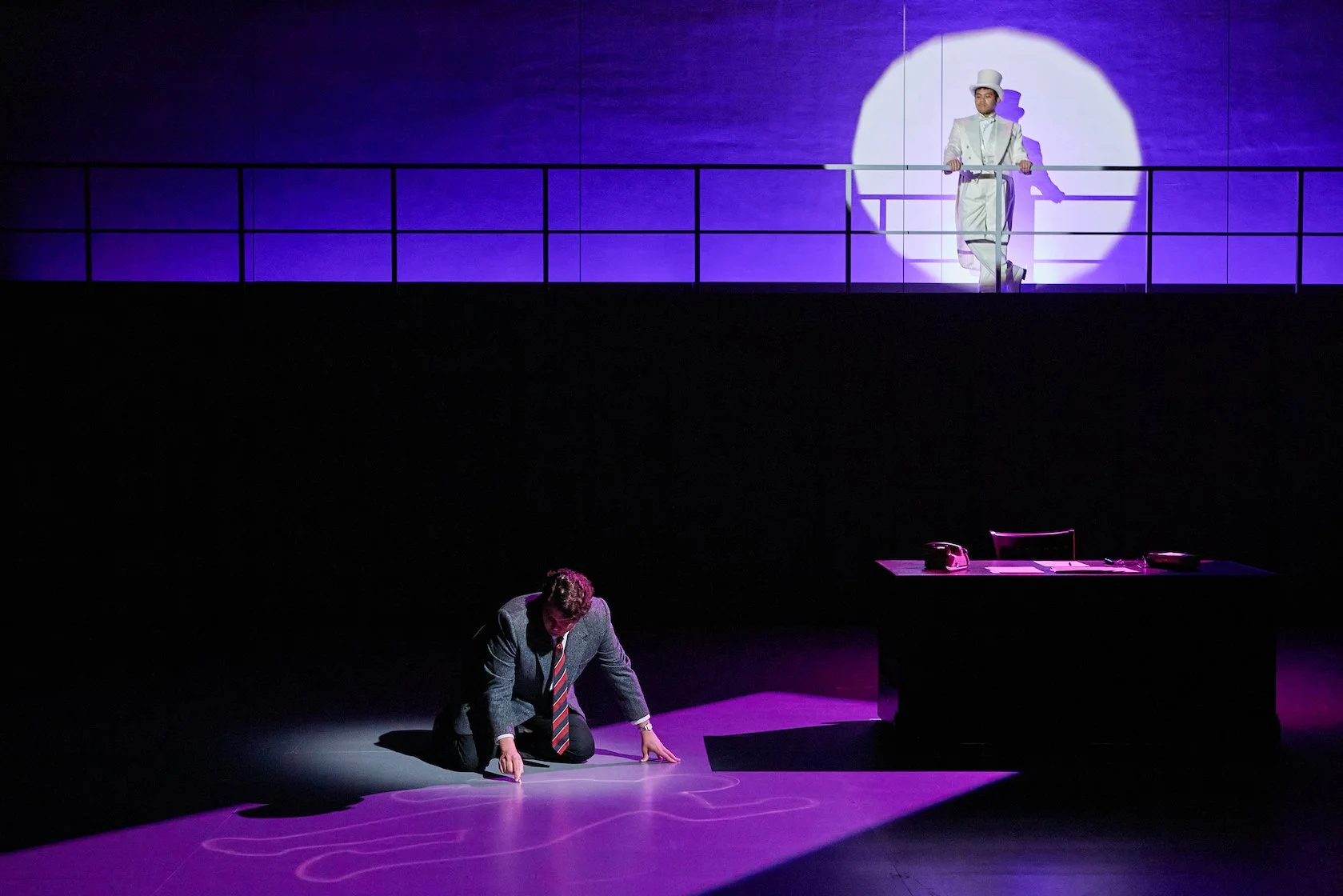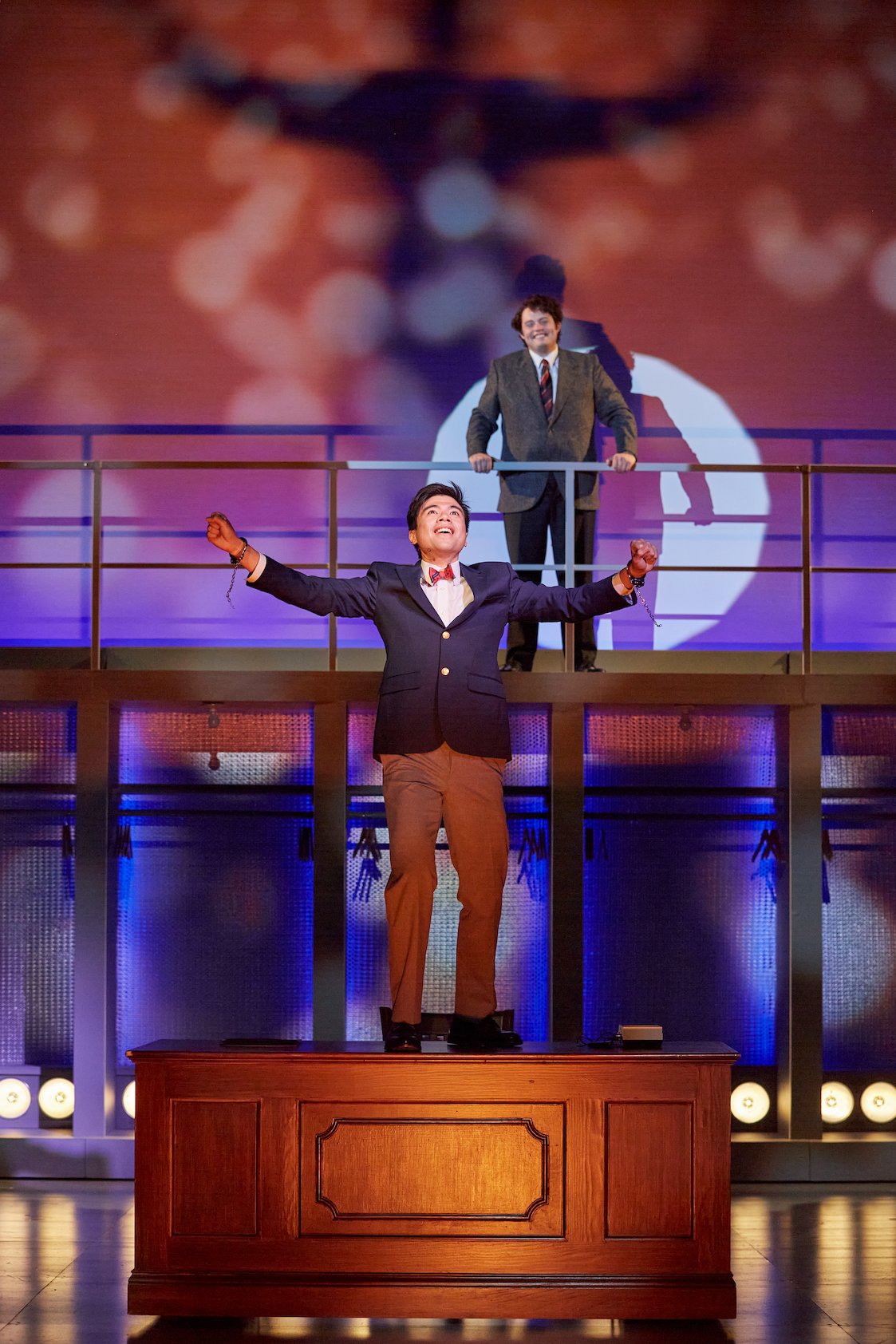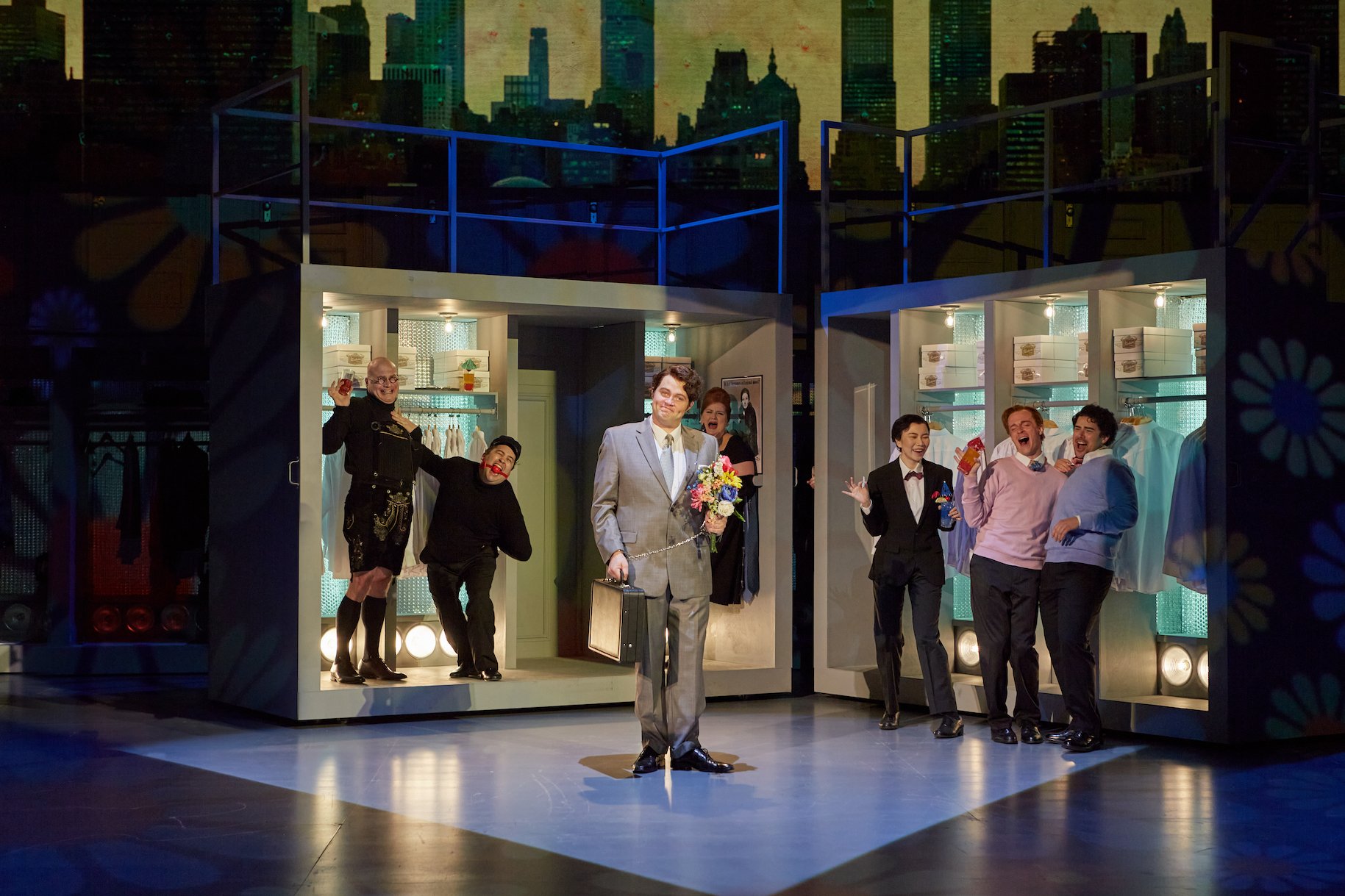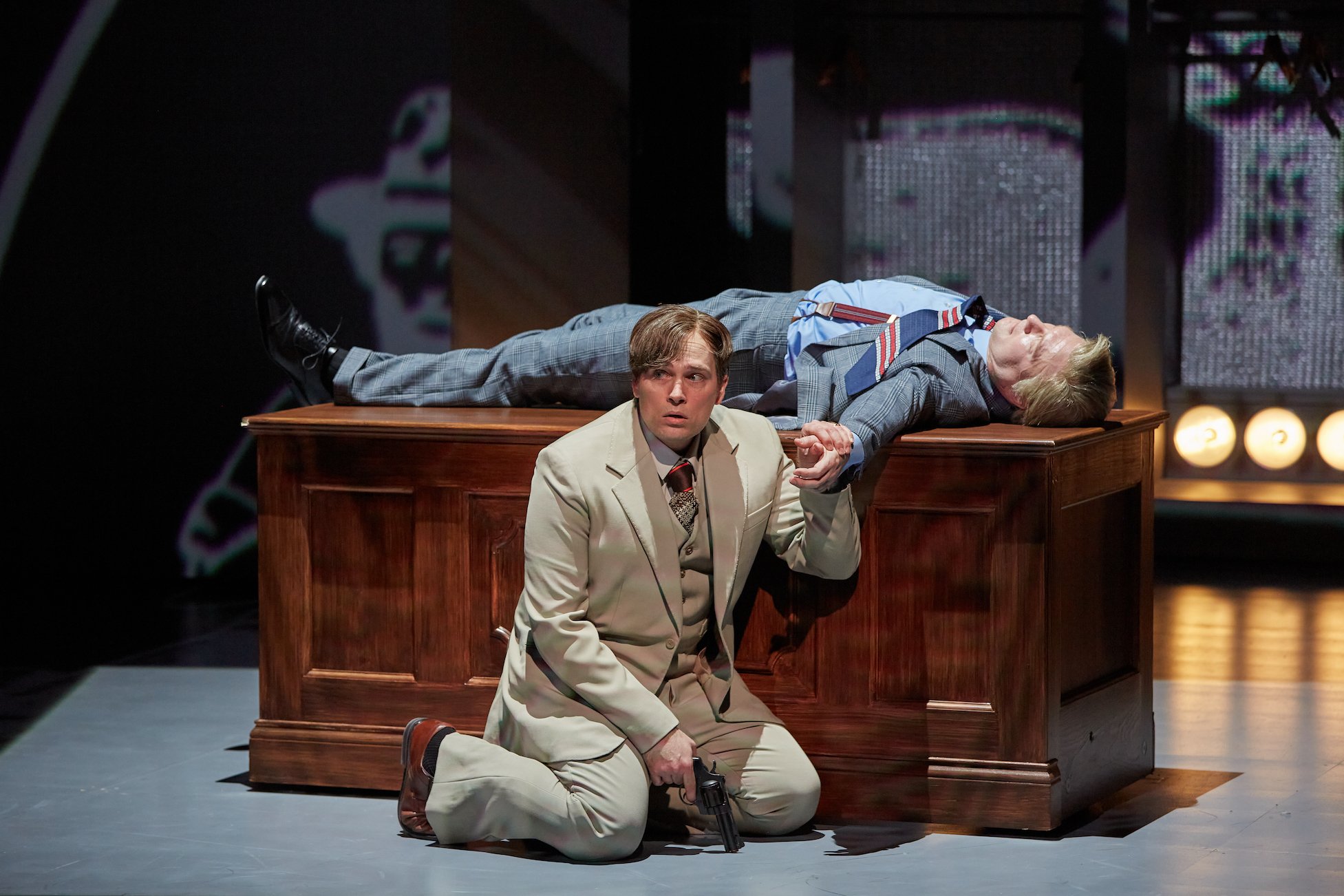OTSL’s “reimagined" Harvey Milk that premiered on June 11 is a revised version of the 1995 Harvey Milk opera by composer Stewart Wallace and librettist Michael Korie presenting the remarkable life of gay activist Harvey Milk. The three-hour original has been pared to two hours, with the music reworked and some scenes trimmed and some deleted; new music has not been added. The composer states the goal remained the same as for the original version, “to create a mythic celebration of Harvey Milk’s life”. I did not see the first version which had a limited run, though I did see the Gus Van Sant 2008 film “Milk”, which incorporated some elements from the opera. Mr. Milk was an opera fan and is now himself the subject of an opera. The reimagined opera (called the New Performing Edition) drives home the creative team’s goal with a focused, cogent opera, full of drama, pathos, supportive music, and showmanship.
Board Supervisor Milk (Thomas Glass) outlines where his body will lay while The Messenger (Kyle Sanchez Tingzon) looks on. Photo by Eric Woolsey; courtesy of Opera Theatre of Saint Louis.
Mr. Milk grew up in a period when being openly gay not only subjected you to a wall of prejudice but commonly might get you arrested and even brutalized by street gangs. His life exemplified extraordinary courage and passionate dedication to the gay community that he loved, and who grew to love him back. He gained national fame as a gay activist and as the first openly gay person elected to the San Francisco Board of Supervisors. His life was tragically cut short at the age of 48. On November 27, 1978. Mr. Milk and his colleague San Francisco Mayor George Moscone were each shot multiple times and killed in their offices by Dan White, a former member of the Board seeking reappointment. Mr. White was an antigay member of the Christian right who had had several clashes with Mr. Milk, conflicts where Mr. Milk persuaded Mayor Moscone to back him for political reasons. Mr. White is a threatening presence throughout the opera, but what happens to him after the murders is not included.
left photo: Harvey Milk (Thomas Glass) looks down on his younger self (Mishael Eusebio). right photo, l to r: Horst (Nathan Stark), Friend 1 (Jesús V. Murillo), Harvey Milk (Thomas Glass), Friend 2 (Mack Wolz), Friend 3 (Xiao Xiao), Closet lover Jack (Nathaniel Sullivan), and Friend 4 (Jonathan Johnson). Photos by Eric Woolsey; courtesy of Opera Theatre of Saint Louis.
Librettist Korie is a former journalist with the Village Voice, but the opera is a gift to art, not news reporting. Any warts Mr. Milk may have had are not included. Mr. Wallace and Mr. Korie have instead created a rolling menagerie of the seminal events and people in Mr. Milk’s life leading to his rise and success as a gay activist. They have transposed time, mixed characters within the same scene, used his mother as a harbinger of Fate, emphasized poignant moments, added some show biz, and included an angelic figure in white called The Messenger. They begin with the ending, the murders, enabling the audience to then focus on his life; we know what’s coming, so our primary interest is what came before.
l to r: Scott Smith (Jonathan Johnson), Teamster (Nathan Stark), Harvey Milk (Thomas Glass), Henrietta Wong (Xiao Xiao), and Anne Kronenberg (Mack Wolz). Photo by Eric Woolsey; courtesy of Opera Theatre of Saint Louis.
The first act focuses on the formative years of Mr. Milk’s largely conventional Jewish life. He often went to the opera when he had an important decision to make. In one of the many poignant scenes, we see the young Milk observing the standing only crowd at the Met Opera populated by men without their wives, and he ponders, “Who are these men without wives…men who cry in public and know the names of dead Polish sopranos”. In another, he engages a walk-in closet of lovers and friends, where he defends his Jewish background while closeted as a homosexual…until a new romantic interest challenges him, “What have you got Harvey Milquetoast, without the right to walk down the street and be who you are?” He comes out of the closet, takes part in the Stonewall uprising, leaves his job on Wall Street, and moves to the Castro District, a predominantly gay area of San Francisco. He loses a campaign for the Board of Supervisors. Following some tender moments in bed, his lover tells him to cut his hair and wear a suit if he wants to be a successful politician. He does. Act II covers his life as a developing politician in SF until his murder and the subsequent vigil. Among the well-known names in the opera are Diane Feinstein, who tries to school Dan White in the art of politics, but Mr. White remains rigid in his approach. Mr. Milk learned the art of politics well, even gaining the support of the conservative Teamsters Union by initiating a gay boycott of Coors beer. The opera includes a metaphysical or spiritual overtone: analogy is drawn to the story of Moses with the angelic Messenger telling Harvey Milk that he will see the promised land he has created but will not enter it.
Composer Wallace’s music for Harvey Milk is enjoyable, supporting the drama with a complex score, creating some unusual orchestral sounds to create mood effects; one listen is not enough to fully appreciate music of such complexity, especially with so much activity on stage. He borrows slightly from Puccini’s Tosca with a modified Scarpia motif to announce the presence of Dan White. The St. Louis Symphony led by Conductor Caroline Kuan played beautifully.
l to r: A Board meeting with Ella Hill Hutch (Melissa Joseph), Gordon Lau (Zaikuan Song), Diane Feinstein (Raquel González), Harvey Milk (Thomas Glass), and Robert Gonzalez (Jesús Vicente Murillo). Photo by Eric Woolsey; courtesy of Opera Theatre of Saint Louis.
Harvey Milk has a large cast; sixteen performers are named, with three singers singing more than one role. An overall strong cast of singers was led by young baritone Thomas Glass as adult Harvey Milk. He sang well and had the stage presence to provide a convincing portrayal of a changing Mr. Milk. I thought there were three other standout performances. If there were Academy Awards for opera, outstanding tenor Alek Shrader would win one for his portrayal of Dan White. Who knew a tenor could make such a sinister villain; maybe he should give Scarpia a spin. Young tenor Jonathan Johnson as Mr. Milk’s lover, Scott Smith, sang beautifully and provided a compelling portrait of tenderness with a backbone. Bass-baritone Nathan Stark gave bravura performances as three characters, closeted-lover Horst, a Teamster, and Mayor Moscone, played so well that I thought they were different singers until I read the credits. I will also mention mezzo-soprano Elizabeth Sarian as Mama, soprano Raquel González as Diane Feinstein, Mishael Eusebio as young Milk, and Henrietta Wong as Xiao Xiao; all gave marvelous performances.
The felled body of Mayor Moscone (Nathan Stark) lays on his desk, as Dan White (Alek Shrader) kneels below. Photo by Eric Woolsey; courtesy of Opera Theatre of Saint Louis.
The staging for this opera was a tour de force. Challenges included moving multiple performers around a relatively small stage with an elevated walkway, even having some sing from the aisles, and multiple scenes staged in both acts, all very efficiently and effectively done. Kudos to Seán Curran and James Robinson who shared stage director duties. Kudos to Set Designer Allen Moyer and Costume Designer James Schuette for effective sets/costumes in scenes ranging from the Met Opera in NYC to a gay parade in San Francisco. These were beautifully augmented by video projections and lighting; kudos to Video Projection Designer Greg Emetaz and Lighting Designer Christopher Akerlind. Harvey Milk is far too rich in storyline, singing, music, and staging to fully appreciate in one serving. It is one new opera I hope to see again.
The Chorus portrays a gay parade in the Castro district. Photo by Eric Woolsey; courtesy of Opera Theatre of Saint Louis.
I saw OTSL’s premiere of Awakenings just before attending Harvey Milk. It was an interesting contrast. Oliver Sacks, author of the book upon which Awakenings is based, is revealed in the opera to be homosexual, a fact he kept from the public until the last few years of his life. He felt constrained, unable to reveal this aspect of who he was and allow that aspect of his personality to blossom. By all reports, Harvey Milk was able finally to fully accept who he was and champion gay life for himself and others. Yet, he was gunned down in the prime of his life by a disturbed man who opposed his lifestyle. One life helps explain the greatness of the other. In a recording to be played after his death, Mr. Milk reveals he knew the risks he was taking. Yet, he took them, and not only for himself. In 2020, Pete Buttigieg, a gay mayor, was able to mount a viable campaign for president, and later be appointed as the U.S. Secretary of Transportation. Harvey Milk celebrates well a life worth celebrating.
The Fan Experience: Opera Theatre of Saint Louis’ 2022 Spring Festival runs May 21-June 26. Performances of Harvey Milk were scheduled for June 11, 15, 17, 19, 23, 25. The opera runs for two and one-half hours. The opera is sung in English with English supertitles projected.
The moderate size venue for the opera is the Loretto-Hilton Center for the Performing Arts on the Webster University campus. This is a modern facility with excellent acoustics; 763 seats are placed in a semicircle of seats around the stage. A special appeal of the venue are the beautiful picnic grounds adjacent to the theater, where you may pre-order picnic boxed meals if ordered 24 hours in advance. You can also choose to provide your own food and beverages to enjoy on the grass or using the tables and chairs provided, some under cover. Free parking is available.







